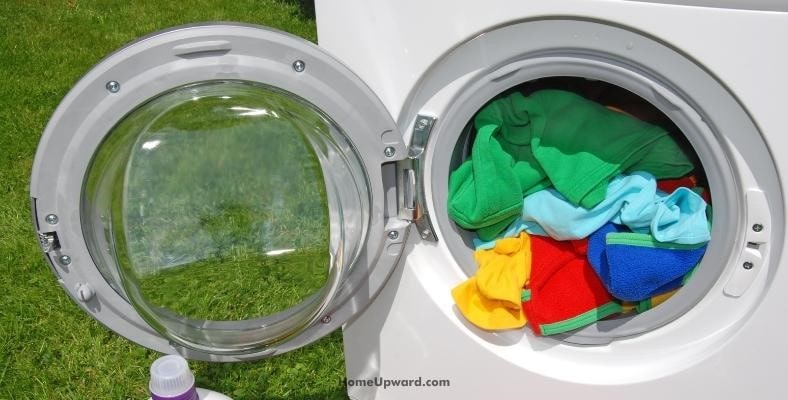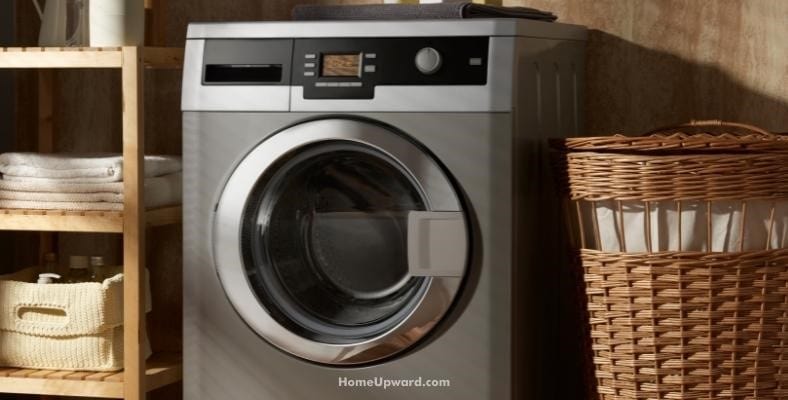Need to keep your washer and tumble-dryer outside or self-storage locations? Depending on your environment and situation there are several good things you can do to protect your expensive washing investment.
Contents
Storing a Washer and Dryer Outside – Tips and Steps to Take
Home appliances are designed for indoor spaces. Here are a few storage steps you can explore to protect your investment.
Ideally you’ll store laundry appliances in dry, weather-proof storage facilities, free of humidity and fluctuating heat and cold.
Cleaning Your Washing Machine and Dryer First
If you’re unsure about disconnecting your appliances safely, consult your owner’s manual. Manuals are available online.
A bit of prep work can prolong the life of your device so it’s well worth the trouble!
Cleaning Your Washer and Dryer
Washer
- Run a hot water cycle (no clothing) to flush residual laundry detergent
- Disconnect the washer by turning off the water valve and breaker switch
- Leave the washer open to dry
Electric dryer or gas dryer
- Wipe the drum with a damp cloth follow this with a dry cloth
- Remove the lint trap and wash thoroughly in soapy water, allowing it to dry
- Disconnect the gas line and set the electrical breaker off to remove power
- Remove the power connections as needed (power cables)
Give Your Washer Time to Dry
Storing your washer with residual moisture in the drum or drain hose may cause mold so be sure to get all the water out and dry it well before storage to prevent mold.
Remove All Detachable Parts
Use the original moving hardware for your washer and dryer as shown in the owner’s manual. If you discarded them, contact the manufacturer for replacement parts or follow their suggested guidelines for useful moving tips.
Gather any removable pieces for safekeeping during transport and storage. Put some notes or labels on them if that’ll help you later to keep track of things.
Moving Your Washer and Dryer
A great tip for moving heavy and expensive appliances is to use protective shrink-wrap and rolling wheels (furniture dollies) or hand trucks.
Make Sure the Doors Cannot Open
Securing the doors with tape prevents them from opening. This safety tip helps protect the appliances and prevents load shifting and tripping accidents.
Wrap Them to Protect Against Damage When Moving
A protective wrap is a great way to prevent damage. The wrap will also fasten doors shut and avoid scuffing and chipping.
Use a Furniture Dolly or Hand Trucks for Moving
Rent or invest in a furniture dolly or hand truck to move your cumbersome appliances to save your back.
Storing Them Properly
Consider raising them off the ground regardless of where you store unused appliances, like a laundry room, garage, storage unit, back deck, or shed.
Using discarded warehouse pallets is a great way to hoist them off the ground and prevent rusting, molding, or water damage.
Cover Your Washer and Dryer
Invest in slipcovers for your appliances or use a fitting, breathable tarp or moving cloth.
Leave the Doors Open Slightly
Allowing airflow may prevent moisture buildup, but be aware of critters.
Can a Washer and Dryer Be Stored Outside?
Depending on the climate, some people successfully use appliances outdoors, but it’s not ideal to expose them to the elements for long periods of time.
The truth is that even if it’s not apparent at first eventually it will take a toll on your washer or dryer and cause things like rust or corrosion along with other problems. Also, pests and bugs can make their home inside them too.
Can Your Appliances Be Left Outside in the Cold?
Appliance manufacturers do not recommend this. Water in the lines may freeze and cause damage to the components.
Will It Hurt a Washer and Dryer to Get Rained On?
While rain may not instantly damage your appliances, water may rust and cause power faults. Allow drying before use.
How Do You Cover a Washing Machine in the Rain?
Either keep it under an awning or roof extension, use specifically designed covers, or use a tarpaulin in a pinch.
Can You Keep a Washing Machine in a Shed?
A shed will protect your washer from elements, raise it off the ground and prepare for storage as suggested above.
Can You Put Stuff on Top of the Washer Dryer?
These are not storage units. Storing materials may ruin the finish and cause unnecessary wear and tear so no, it’s not a good idea to put heavy things on top of a washer or dryer.





